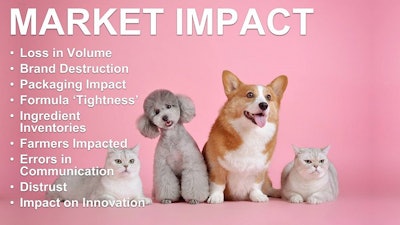
It’s difficult to characterize anything related to the Food and Drug Administration (FDA)’s ongoing investigation into canine dilated cardiomyopathy (DCM) and grain-free products as good news, particularly its alerts and updates about the situation. They have definitely impacted grain-free pet food sales, which in turn has affected many people, both in and out of the pet food industry.
However, I suppose it’s a positive development that, in its latest presentation to an industry audience, an agency representative said there was no new information from the investigation to announce, and they don’t foresee any announcements happening in the near future. The representative was David Edwards, Ph.D., an officer with FDA’s Center for Veterinary Medicine’s Office of Surveillance and Compliance, speaking at the 13th Annual Pet Food Conference organized by the American Feed Industry Association (AFIA) during the International Production & Processing Expo on January 28 in Atlanta, Georgia, USA.
FDA public updates: ‘none planned at this time’
I had been hearing rumors from various people in the industry that a new investigation update from FDA was imminent. It’s not an understatement to say everyone was rather concerned, bracing for another possible bombshell announcement like the one the agency made in June 2019, in which it named pet food brands implicated in its investigation.
That’s probably why the AFIA conference had a record turnout of more than 300 people. In fact, with Edwards as the last presenter of the day, the audience was still fairly sizable in the afternoon, compared to what can typically happen at all-day conferences. He even ramped up the anticipation by having the DCM investigation as his last topic of several.
Thus, Edwards’ comments about the investigation were rather anti-climactic – though I don’t think anyone was complaining. “As for public updates, there are none planned at this time,” he said, even repeating the statement and adding that the agency was still waiting until it had new information to report.
Instead, most of the DCM part of Edwards’ presentation was a history of the investigation and rationale behind FDA’s announcements. He commented that, while he had spent most of the day in another meeting, a few of his colleagues had been at the pet food conference all day and told him DCM had been a topic of several other presentations. Perhaps that’s why he came off sounding rather defensive.
‘We may never figure this out’
The other conference presentations that Edwards alluded to included a U.S. pet food market update from Maria Lange, vice president of strategic verticals pet and cannabis for Nielsen, in which she provided data showing the decline in grain-free pet food sales, tying it to FDA’s announcements. In addition, a panel of three pet nutrition experts talked about the impact of the FDA investigation and announcements, plus their insights and possible directions for future nutrition research.
Joe Bartges, DVM, Ph.D., professor of medicine and nutrition in the Department of Small Animal Medicine and Surgery at the University of Georgia, led off the panel with some frank views and statements, most critical of FDA’s investigation and information issued by a few groups of veterinarians:
- He said he “loathes” the term BEG (boutique, exotic proteins, grain free) diets, coined by one of the veterinary groups. (A few people in the audience applauded that statement.)
- “When you only look for what you want to see, you will only see what you wanted to look for,” he commented, referring to the data and analysis issued by FDA and some veterinary groups to date.
- His own analysis of data released by FDA showed a huge jump in cases in 2018 – because FDA told veterinarians and owners to report cases, he said. Plus, the majority of cases were in dog breeds with either a familial association or genetic predisposition to DCM.
- He also shot holes in FDA’s June 2019 announcement naming pet foods that had been implicated in the cases, saying some on the list were specific products, while others were entire brands or even companies, making it difficult to assess if there truly were issues with certain products.
- “Vets are bad at taking down data,” he said, explaining that most of the cases did not have a complete diet history for the dog, and other things consumed could be playing a role.
Bartges’ bottom-line statements were not positive. “Not all grain-free diets are bad, and the ones implicated just have a loose association.” But he added that it's difficult for a vet to tell an owner closely attached to and concerned about his or her dog that the data only shows so much. His advice to owners would be, if you’re worried, then feed a food with grain. And not from a brand on the FDA list. “Sorry,” he said to the audience, “but that’s all I have to go on.”
Probably most concerning of all were his closing remarks. “We may never figure this out,” Bartges said. “It may be nature AND nurture,” which is very complex. However, this is not going away, he added, because it’s not easily explained the same way that toxins, contaminants and imbalances related to pet food typically are. Meanwhile, owners think their dogs are having “heart attacks” related to diet. They understandably want answers.
Focus on amino acids, protein quality, peer-reviewed research
Another panel member, Kate Shoveller, Ph.D., assistant professor in the Department of Animal Biosciences at the University of Guelph, suggested pet nutrition research areas to explore – if not just to find a definitive cause for these DCM cases, then at least to better understand many elements of formulations and nutrition.
Specifically, she focused on amino acids and protein quality. “I have said before, and I still believe, the pet food industry needs to come up with a way to measure protein quality,” she commented. Those measures would need to look at protein content, amino acid composition, protein and amino acid digestibility for the species eating the food. Shoveller referred to a new research paper coming out soon with data from Kansas State University’s pet food processing lab, which she said will corroborate data released by the companion animal nutrition program at University of Illinois in 2019.
Considerations for pet food formulators, she added, included:
- Amino acid requirements are greater than the minimum regulatory guidance, and you should have targets, at minimum, for lysine, threonine, methionine and tryptophan.
- Peas and most legumes are limiting in methonine and completely lack taurine and L-carnitine.
- Methyl-donating and -accepting nutrients should be included in diets to spare methionine for protein synthesis and the synthesis of metabolites such as taurine.
George Collings, Ph.D., president and general manager of Nutrition Solutions and the third panelist, discussed how this current DCM situation is demonizing yet another category of pet food ingredients (joining corn, byproducts and others), which further complicates the formulation of complete and balanced pet foods that also meet market and consumer demands.
Besides the request to “stop demonizing ingredients,” other recommendations from Collings included the need for more complete science. “We need to tell consumers what we know to be true,” meaning not issuing data or information based on incomplete science or the lack of peer review. “We also need to engage in genetic and nutrition research,” he said and adjust nutrient profiles if necessary.
“Above all, communicate the importance of an overall balanced food regimen” for pets, he concluded.


















